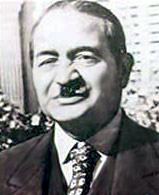 Dr. Shanti Swaroop Bhatnagar is a well-known scientist. He is remembered for having established various chemical laboratories in the country known as `The Father of Research Laboratories`. He used to spend all his spare time in his laboratory doing research. He established a total twelve national laboratories such as `Central Food Processing Technological Insitute` Mysore; `National Chemical Laboratory` Pune; `the National Physical Laboratory` New Delhi; `the National Metallurgical Laboratory` Jamshedpur; `the Central Fuel Institute` Dhanbad just to name a few.
Dr. Shanti Swaroop Bhatnagar is a well-known scientist. He is remembered for having established various chemical laboratories in the country known as `The Father of Research Laboratories`. He used to spend all his spare time in his laboratory doing research. He established a total twelve national laboratories such as `Central Food Processing Technological Insitute` Mysore; `National Chemical Laboratory` Pune; `the National Physical Laboratory` New Delhi; `the National Metallurgical Laboratory` Jamshedpur; `the Central Fuel Institute` Dhanbad just to name a few.
This Indian scientist was born on 21st February 1894 in Shahpur now in Pakistan. When he was only eight months old his father died. While spending his time in the maternal house with engineer grandfather, a liking for science and engineering was developed within him. He also inherited the gift of poetry from his maternal family. `Karamati` one-act play in Urdu written by Dr. Shanti Swaroop Bhatnagar won the first prize in a competition. This eminent scientist died on 1st January 1955 in New Delhi, India.
After completing Master`s Degree in India Dr. Shanti Swaroop Bhatnagar went to England on a research fellowship. In 1921 he received D.Sc from London University. He joined `Benaras Hindu University` as Professor. As a reward for his research in science British Government `Knighted` in the year 1941. Dr. Shanti S. Bhatnagar was elected as a Fellow of the Royal Society on 18th march 1943.
Dr. Shanti S. Bhatnagar`s research interest includes emulsions, colloids and industrial chemistry. Emulsion is a mixture of two unblendable substances one substance is dispersed in the other. Like butter and margarine, espresso etc. A colloid is a type of homogenous mixture i.e. mixtures that have definite, true composition and properties. But his fundamental contributions were in the field of magneto-chemistry. He used magnetism as a tool to know more about chemical reactions. Accompanied with Physicist R.N Mathur, Dr. Shanti S.Bhatnagar designed "The Bhatnagar-Mathur Interference balance". A British firm manufactured their designed structure.
Dr. Shanti S. Bhatnagar also composed a beautiful `kulgeet` (University song) which sung with great reverence prior to functions held in the university. As Nehru was much in favor of scientific development after Independence, "Council of Scientific and Industrial Research" was set up under the chairmanship of Dr. Bhatnagar. . He became the first director-general of the Council of Scientific and Industrial Research (CSIR) in 1940. Later, he was awarded `Padma Bhushan`. After his death, CSIR established a Bhatnagar Memorial award for eminent scientists in his honor.




















